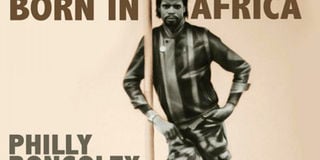The story of Philly Bongoley Lutaaya

Philly Bongoley Lutaaya
What you need to know:
- What was about to unfold before the cameras and recorders was an unusual event, yet the person they were there for, Philly Bongoley Lutaaya was by then a public figure, a celebrated musician.
BIOGRAPHY
On April 13, 1989, the press were joined by music lovers, health professionals, diplomats, politicians, and ordinary Ugandans at the Kampala Sheraton Hotel for an unusual press briefing.
What was about to unfold before the cameras and recorders was an unusual event, yet the person they were there for, Philly Bongoley Lutaaya was by then a public figure, a celebrated musician.
Into a microphone before him, Philly announced to his audience that he had acquired the dreaded HIV/AIDS disease. “Fellow comrades of Uganda, it is with utmost regret that today, I inform you that the sickness bothering me has been diagnosed as AIDS,” he declared.
His audience was bewildered. While the rumour mill was aghast with the possibility of the celebrated musician carrying the dreaded HIV virus, few were prepared for such news.
It’s important to bear in mind that in the early stages of HIV/AIDS, the virus was associated with imminent death and persons living with it faced a great deal of discrimination. This book is the story of that phenomenal man.
Andrew Ssempala Ssengendo traces the story of Philly Lutaaya to his great grandparents, and the story and the readers will be surprised to learn his connection Semei Kakungulu.
With both his parents school teachers, Philly Lutaaya was born into a relatively wealthy family. He had a good chance at education, until he decided at age 17, that his heart was elsewhere, and his passion drove him into making music. Fortunately for the future music legend, his father was supportive.
In the 60s and 70s, doing music was much harder than anything it is today, but he persevered, as the author writes, he tried his hand with different groups in Kampala until he met a Zairean band.
Unfortunately for him, the band was soon headed back to Zaire (present day DRC) and he had a quick decision to make.
Feeling he needed mentorship from the band, he decided to follow it to Kinshasa without telling any of his relatives for fear that they would dissuade him from making the 3500+ journey to the Zairean capital by road. Unable to find him in Kampala, his family traced him in Zaire over year later and arranged his return.
In Uganda, he continued to sing, until insecurity forced him to Kenya from where he connected to Sweden.
Abroad, he joined hand with Ugandans and from a band, there they were exposed to the best music instruments of the time and took full advantage of it all.
He later went solo, and his music started getting the much needed recognition back at home. He returned and staged some concerts – the biggest till then and for some years to come – as the author writes.
When all seemed well for the musician, as he received the much desired airplay at home and abroad, the devil, as they say, had other plans.
After a series of repeated on-and-off sickness, his Swedish doctors broke to him the devastating news on his HIV/AIDS status.
In the 80s, HIV/AIDS was in its nascent stages, not much was known about how it spread, and it would take several years before ARVs became available and accessible to persons living with HIV/AIDS at home and abroad. So, despite his status and fame, the news meant Philly Lutaaya, only 37 then, didn’t have much long to live.
As Abraham Lincoln put it, Philly Lutaaya knew that it was the years in whatever was left of his life that would count, but the life in those years – or months for that matter.
So, he decided to do that by lending his voice and name to the HIV/AIDS fight, or as he put it, he decided to give HIV/AIDS a face.
Quickly, he moved from the musician to the HIV/AIDS activist. He played his new role so well that when a group of American documentary producers set out to produce a documentary on HIV/AIDS in Africa, they head his story and decided it was all they needed and in the end, Born In Africa – the documentary available on YouTube – is more a story on Philly.
For a man with a day to his name – 17 October – and Christmas carols that rule the airwaves many years after he is gone, Philly Lutaaya’s life is hard to put down into a book, but Ssempala dared and did a commendable job. Great book, easy read.
Title
Born In Africa
Author
Andrew Ssempala
Pages
266
Price
Shs50,000
Where:
Most bookshops in Kampala.




